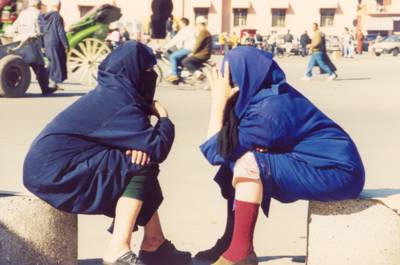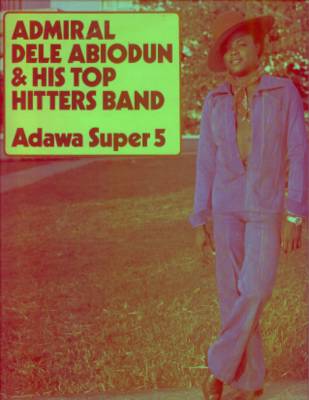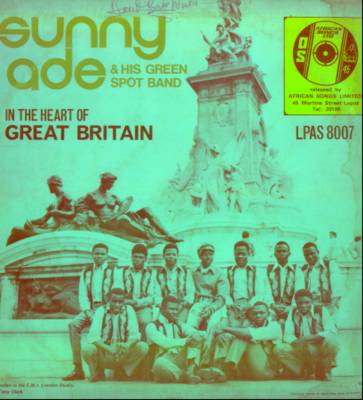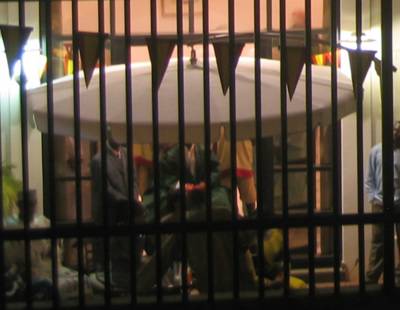I took out Minority Report last night from the local DVD rental place. I’d planned to watch it again from a post Iraq invasion perspective – the pre-crime plot taken as an uncanny Hollywood precursor to Bush’s pre-emptive strike policy etc. Settling down to watch, booming bass noises came from somewhere below. I took it that the unhappy second wife in the flat downstairs was trying out a new hi-fi system – perhaps to drown out her sorrows. Then Bibi came back from work and spotted from our living room balcony that the Spanish Embassy was having a bash. She also told me that the second wife has had a row with her oga (we got the gist from servant gossip in the compound via our cook Joe) and flown off to the UK in a huff.
We have an intimate view of the back of the embassy (with a glimpse of their pool), but not so much as an ambassadorial crafty fag (let alone shag) has happened in the six weeks we’ve been here – until yesterday. It turns out it was Spanish National Day yesterday (whatever that is – what do they do, mourn Franco, talk about Ferdy and Isabella or avoid talk of the civil war?). The embassy garden was decked out in Spanish flag bunting. By ten, the place was filled with a graceful mix in evening wear and native as a jazz band bashed out standards with a surprisingly accomplished level of musicianship. I got out my Zenith binoculars (my only heirloom) and sat in the shade on our balcony to observe. I had a filmic sensation, like being caught in a mixture between Rear Window and a West African Woody Allen.
There were beautiful women in elegant dresses and natty hairdos. Business cards fluttered between bodies like butterflies or bees distributing corporate pollen. A tall man wore a tall light grey bowler hat – signalling he is from the Delta region (perhaps Opobo – well known for their appropriation of the English gentleman’s headgear). He reminded me of that voodoo ritual scene in the Bond film set in some Caribbean location (Live and Let Die?) Several women greeted him, drawn like magnets to the money. With my 10x50s, I could focus very closely on his face. It was easy to spot the ones he’d slept with from the twinkle in his eye, and which women would like to sleep with him from the twinkles in theirs. Damn, I need to get hold of those binoculars that have long range microphones in them when I go back to the UK.
Most striking of all was the kingly figure on the left of the scene (see photos below). They’d reserved a whole room for him to sit on a makeshift throne, looking out onto the scene from a royal distance with appropriate level of detachment from the melee. He was decked out in an emerald green flouncy gown, with chunky orange bead bracelets, one thick shiny gold ring and a white head wrap. He looked like a sultan, except the large crucifix necklace confused the issue. Beside him, an attendant stood stiff in what looked like yellow football shorts with red edging. A huge wide flanged golden sword was held behind him as if to deflect bad juju. His hands were elegantly clasped in front throughout, exuding composure. People took it in turns to sit with him on a chair perpendicular to his own. He would bend gracefully forwards and down to listen – signalling that the royal ear requires an act of grace to listen down to the commoner. A friend was at the party (I watched him and his fiancé working the crowd voraciously). It turned out the royal being is the Egwege of Ogba (or similar) and had any ice-cutting Etonian accent. All very Elizabethan in detail and courtliness and a reminder of how the West is used as a plug-in to elsewheres that exist in pre-modern times (just like the ritualistic fabricated anachronisms of the UK Houses of Parliament).
Across Nigeria there is huge capacity for monarchical structures and symbolic hierarchies. The royal personage is given a title according to a standard linguistic formula: the x of y, where x is the level of royalty or title (emir, oni, egwege or alternative in the local language) and y is the place. As there are many places, many languages and many levels between the commoner and the throne, the whole system permits a proliferation of royal beings, rather than just the handful you get in western nations. Which is a smart idea, as the Chief trades his newly acquired status with elaborate systems of re-distribution (those who prostrate themselves before you must also be ‘dashed’).
So Minority Report was interlaced with trips to the balcony as Autumn Leaves segued to Lionel Richie. It turns out that the Pre-Crime unit gets banned as it is too close to a self-fulfilling prophesy – future murderers have a choice on the cusp of the murderous moment which is denied by Lamar’s absolute faith in the pre-cogs prescience. In other words, an exact parallel with what is happening in Iraq with Al-Qaeda (the link with Iraq was pre-emptively imagined to exist even though it didn’t, which was precisely the mechanism required in order to make it exist). Bush had a choice, but he chose not to take it.
But then speaking of Bush as having a choice is to impute intelligence to a simulacrum – especially if we follow the analysis of an article on C-Theory recently. Bush is, according to the article, a fictional being – a man without personality, human quality or any vestige of intelligence. He is in other words the perfect politician in a hyperreal world full of viewers rather than readers – viewers can project whatever they want onto him and perceive measured intelligence on a face which in reality covers a blank mind.
All of which (royalty in West Africa, presidential projections in the West) makes you think how powerful surfaces have become in our spectacular society. Except that Bush is making a tit of himself in the presidential debates – which shows that apocalyptic theories of the hyperreal forget one vital thing: that there are still moments of unscripted expression where the truth leaks out and the simulacraic structure collapses like a house of cards.
Read more...
















